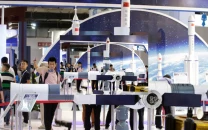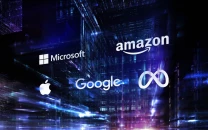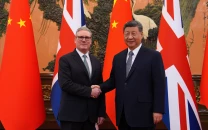The rhythms of politics
Indian election is a mammoth exercise and it goes to credit of people and election commission that it works so well.

The writer is a consulting editor with The Statesman and writes for several newspapers in India
As the days roll by, the tongues sharpen. Minister for External Affairs Salman Khurshid landed himself in trouble by calling Modi impotent. Although he used a perfectly admissible English word, the BJP took it literally and attacked the minister who refused to back off until Rahul Gandhi – rather unnecessarily in my view – entered the picture, and grim-faced, said he did not condone such language! The BJP, always in the lead, of course had no such compunctions with the Madhya Pradesh chief minister, maintaining at a public rally for Modi that he was like the hair from a moustache, while Rahul Gandhi was like the hair from a tail! No one from the Congress protested and the BJP, of course, did not even think of retracting.
Dalit leader Ram Vilas Paswan crossed over to the BJP, asserting his ‘secularism’ till the very end. The politician, who had left the BJP-led National Democratic Alliance to register his protest against the violence in Gujarat, has shown no hesitation in joining the BJP led by the same chief minister of Gujarat, Narendra Modi. The reason was to get more seats to contest in Bihar, straight and simple.
Rashtriya Janata Dal leader Lalu Prasad Yadav is finding making a sound comeback in Bihar difficult. Even as he was immersed in talks with the Congress for an alliance in the state, several of his legislators walked out to join the Janata Dal (United). Lalu Yadav, who was in Delhi, rushed back to Patna and while he managed to get a good number of them back, the jolt has been severe. And the party is clearly simmering.
This is to say that the fun and games have begun and the heat is going to become more intense in the run-up to the elections, expected to be held from April into May. The Aam Aadmi Party (AAP) is trying to target specific leaders and select candidates known for their intellect and probity. This is a difficult task, particularly for a new party that wants to field at least 400 candidates across the country and lacks resources, nor does it have polling committees in place. The AAP is over-relying on a wave that does not seem to be making itself felt outside Delhi and Haryana.
Indian elections are complex, with every state having its own issues. For instance, Tamil Nadu Chief Minister Jayalalithaa, who is eyeing the prime minister’s chair, took the law into her own hands and ordered the release of the assassins of former prime minister Rajiv Gandhi. The Supreme Court has intervened, but interestingly, the other political parties did not raise a storm beyond a small point. This is because the AIADMK is a potential ally for most, and is expected to do fairly well in the state in the Lok Sabha elections.
Then there is the issue of religion and caste, with the equations getting sharpened as the political parties play to these galleries unashamedly. Every vote bank asserts itself as this is the only time when the poor and marginalised are heard by those who need and seek their votes. Significantly, these generally ignored sections of society are not as easily fooled as they were decades ago. There is a realisation that they are being converted into pawns by unscrupulous politicians and a resistance is clearly felt on the ground. However, this is often negated by the absence of choices and alternatives.
The Indian election is a mammoth exercise and it goes to the credit of the people and the election commission that it works so well. Millions come out to vote, with rural voters donning their best in what for them is clearly a celebration of democracy. The rich and the upper-middle class use the holiday to relax, with not many willing to brave the queues at polling stations. But their reluctance is more than compensated by the poor and rural voters across the country as they spend hours to cast that one vote they hope will make a difference to their future!
Published in The Express Tribune, March 1st, 2014.
Like Opinion & Editorial on Facebook, follow @ETOpEd on Twitter to receive all updates on all our daily pieces.



















COMMENTS
Comments are moderated and generally will be posted if they are on-topic and not abusive.
For more information, please see our Comments FAQ